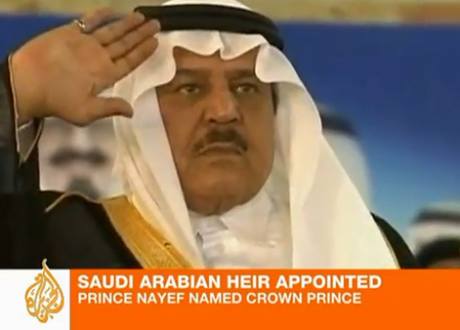
Prince Nayef. Photocredit: http://www.youtube.com/watch?v=wfrCX1ugF4Q
Prince Nayef bin Abdul Aziz, the septuagenarian interior minister of Saudi Arabia, has been named as the Crown Prince, which means that he stands to inherit the throne. Saudi Arabia is a key country for global stability – it’s one of the world’s top oil exporters – and its co-operation with the West in the fight against terrorism is considered crucial in Washington and beyond. What does this vitally important succession mean for the world? Commentators are cautiously optimistic as a picture emerges of a hardliner who, despite his allegiances, may be willing to move with the times.
Not a little prince. He’s a half-brother of the current King Abdullah: his full brother was King Fahd. He’s a member of the powerful Sudairi Seven (a well-favoured princely clique). Al Jazeera’s profile gave the facts: he was born in the west of Saudi Arabia in 1934, and was governor of Riyadh when “barely 20”; he worked in the interior ministry and was made its head in 1975. His work there has centred on “stamping out” perceived “threats to Saudia Arabia’s stability.” His security forces number 130,000, and his power base is with Islamists; however, though he is supported by the Wahhabi clerics, he’s not a fan of the Muslim Brotherhood – since he sees them as a threat to the royal family.
“It is impossible that 19 youths carried out the operation of September 11, or that bin Laden or Al Qaeda did that alone … I think [the Zionists] are behind these events,” said Prince Nayef, quoted on The New York Sun.
We should be scared? Nayef is a hardliner, said Tara McKelvey on The Daily Beast. He’s well admired as an administrator, “formidable and imperious”, but also “a known quantity” in Washington. His counterterrorism efforts have been “aggressive”, led by his son, Muhammad. A moderniser he may not be, but he has adopted a “forward-looking approach”, reprogramming prisoners away from violence and extremism. Whether the programme has been successful or not is another matter. He’s also an advocate of military force, sending troops into Bahrain to put down the uprising.
Maybe not. However, McKelvey continued, there is hope: King Abdullah is moving towards a more open government, allowing women the vote (though the change won’t be implemented until 2015). He’s also invested in housing and the public sector. People are worried that the pious Nayef will be at the mercy of darker forces. But people change – and Nayef has been in the administration whilst Abdullah’s reformed. Nayef’s an old horse – and a “survivor.” Saudi Arabia will need a strong hand when Abdullah goes, and it looks like Nayef’s the man.
“Political dissent seems to get under his skin”, said Human Rights Watch’s Christoph Wilcke, quoted on The Daily Beast, “and the Saudi response to Arab Spring activities at home has been unflinching repression.”
Watch out for the little princes. Hey may be the man, but he’s an old man, said The Economist. Saudia Arabia is governed by “a coterie of very old, very conservative princes”, more and more out of touch with the world. Nayef has “severe diabetes, wobbly knees and a famously mercurial temperament.” He doesn’t like women’s rights; he’s stifled freedom of speech, and he has close ties to the conservative Sunnis. He also doesn’t like Iran. His son, Muhammad is the one that should be credited for the anti-terrorism techniques. By the time the present King dies, the council of princes who will ratify the choice of the King will be dominated by younger princelings – and maybe they will show their teeth and choose one of their own.



COMMENTS ( 1 )
posted on 28 March at 15:19
Well com To every boday.